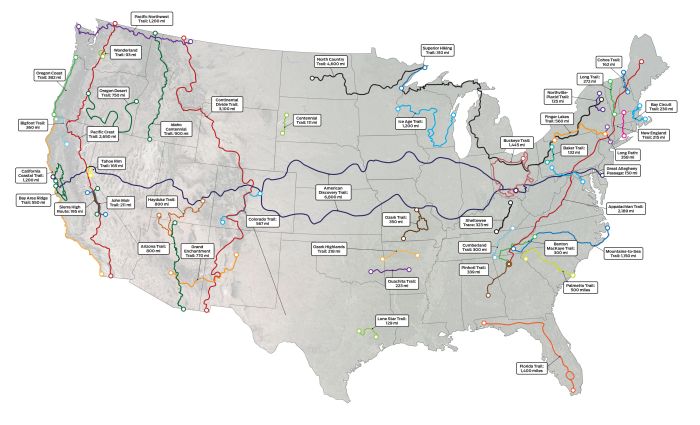Thru Hiking Trails represent a unique blend of physical endurance, mental fortitude, and profound self-discovery. Embarking on a thru-hike isn’t just about conquering miles; it’s about confronting your limits, connecting with nature on a visceral level, and forging an unbreakable bond with the trail itself. This journey, demanding in its physicality and deeply rewarding in its introspection, has captivated adventurers for generations, transforming lives and leaving an indelible mark on the human spirit.
From the iconic Appalachian Trail to lesser-known gems across the globe, the allure of thru-hiking lies in its challenge, its solitude, and the unexpected camaraderie it fosters.
This comprehensive guide delves into the world of thru-hiking, exploring everything from the historical rise in popularity and the physical and mental challenges, to meticulous planning, environmental responsibility, and the vibrant community that thrives along these epic trails. We’ll examine the best practices for ensuring a safe and successful journey, while also reflecting on the transformative power of this incredible adventure.
Whether you’re a seasoned hiker or a curious beginner, this guide will provide invaluable insights and actionable strategies to help you plan your own unforgettable thru-hike.
Post-Thru Hike Reflections and Experiences: Thru Hiking Trails

Completing a thru-hike is a transformative experience, a crucible forging both physical and mental resilience. The immediate aftermath, however, often presents a unique set of challenges as individuals transition from the rigorous demands of the trail back into the complexities of everyday life. Understanding these adjustments and developing effective strategies for reintegration is crucial for maximizing the long-term benefits of this incredible journey.The physical and emotional adjustments after a thru-hike are significant and multifaceted.
Imagine the sudden shift from a life defined by daily physical exertion and a minimalist existence to one potentially filled with sedentary work and societal pressures. This contrast can lead to a range of physical symptoms, from muscle soreness and fatigue to sleep disturbances and even weight fluctuations. Emotionally, the return can be equally jarring. The profound sense of accomplishment can be intertwined with feelings of loss, loneliness, and a sense of displacement, as the familiar rhythm of the trail is replaced by the unfamiliar routines of daily life.
This “post-hike blues” is a common experience, and recognizing it as a normal part of the process is the first step towards navigating it successfully.
Physical and Emotional Adjustments Post-Thru Hike
The physical toll of a thru-hike is undeniable. Months of strenuous activity, often in challenging conditions, take their toll on the body. Many thru-hikers experience a significant drop in physical fitness levels after returning home, struggling with muscle atrophy, decreased endurance, and increased susceptibility to illness. Simultaneously, the emotional impact can be profound. The intense camaraderie of the trail, the daily rhythm of walking, and the sense of purpose and accomplishment are suddenly absent.
This can lead to feelings of isolation, depression, and anxiety. Some hikers struggle to reconnect with friends and family, finding it difficult to articulate the profound experiences they’ve had on the trail. The drastic shift from the simplicity and solitude of the trail to the complexities and demands of modern life can be overwhelming. For example, a hiker used to making decisions based on immediate needs (water, shelter, food) might find navigating complex social situations or making long-term plans incredibly challenging.
Personal Growth and Self-Discovery Through Thru-Hiking
Thru-hiking fosters immense personal growth and self-discovery. The sustained challenge of the trail forces individuals to confront their physical and mental limitations, pushing them beyond perceived boundaries. This process often leads to a heightened sense of self-awareness, resilience, and confidence. For instance, conquering a challenging mountain pass not only builds physical strength but also cultivates mental fortitude and problem-solving skills.
The solitude of the trail allows for introspection and self-reflection, leading to a deeper understanding of one’s values, priorities, and aspirations. Many hikers report a newfound appreciation for simplicity, nature, and the importance of human connection, often forging life-long bonds with fellow hikers. The experience can also lead to significant shifts in career paths, relationships, and overall life direction.
Lasting Effects on Life and Perspective, Thru Hiking Trails
The lasting effects of thru-hiking on an individual’s life and perspective are often profound and long-lasting. The experience can instill a deep appreciation for nature and the environment, fostering a greater commitment to conservation and sustainability. The challenges faced on the trail build resilience and adaptability, qualities that translate to success in various aspects of life. The enhanced self-awareness gained through introspection often leads to improved mental health and emotional well-being.
The friendships forged on the trail often become lifelong bonds, providing a supportive network long after the hike is complete. Many hikers report a renewed sense of purpose and direction in their lives, with a greater clarity regarding their values and aspirations. For example, a hiker might use their experience to inspire others, become an advocate for environmental protection, or pursue a career aligned with their newfound passions.
Post-Hike Challenges and Reintegration Strategies
Successfully reintegrating into daily life after a thru-hike requires careful planning and self-awareness. Common challenges include difficulty adjusting to a sedentary lifestyle, struggles with employment or finances, and difficulties reconnecting with pre-hike relationships. Many hikers find it difficult to explain the transformative experience to friends and family who haven’t shared a similar journey. To facilitate a smooth transition, hikers should consider developing a post-hike plan that includes gradual reintroduction to physical activity, financial planning, and strategies for maintaining social connections.
Seeking support from fellow hikers, therapists, or support groups can be invaluable during this period. Creating a structured routine that incorporates elements of the trail’s simplicity and mindfulness can help maintain a sense of balance and prevent feelings of overwhelm. For example, incorporating daily walks or meditation into their routine can help maintain a sense of peace and purpose.
Regular communication with friends and family, sharing their experiences and feelings, can also help strengthen relationships and prevent feelings of isolation.
The allure of thru-hiking trails transcends mere physical achievement; it’s a journey of self-discovery, resilience, and connection with the natural world. From the meticulous planning and preparation to the unexpected challenges and profound rewards, the experience leaves an indelible mark on those who dare to embark on it. This guide has offered a glimpse into the multifaceted aspects of thru-hiking, providing practical advice and inspiration for aspiring adventurers.
Remember, the trail awaits – but preparation, respect for nature, and a spirit of adventure are essential companions on this incredible journey. So, pack your bags, embrace the unknown, and discover the transformative power of the trail.

